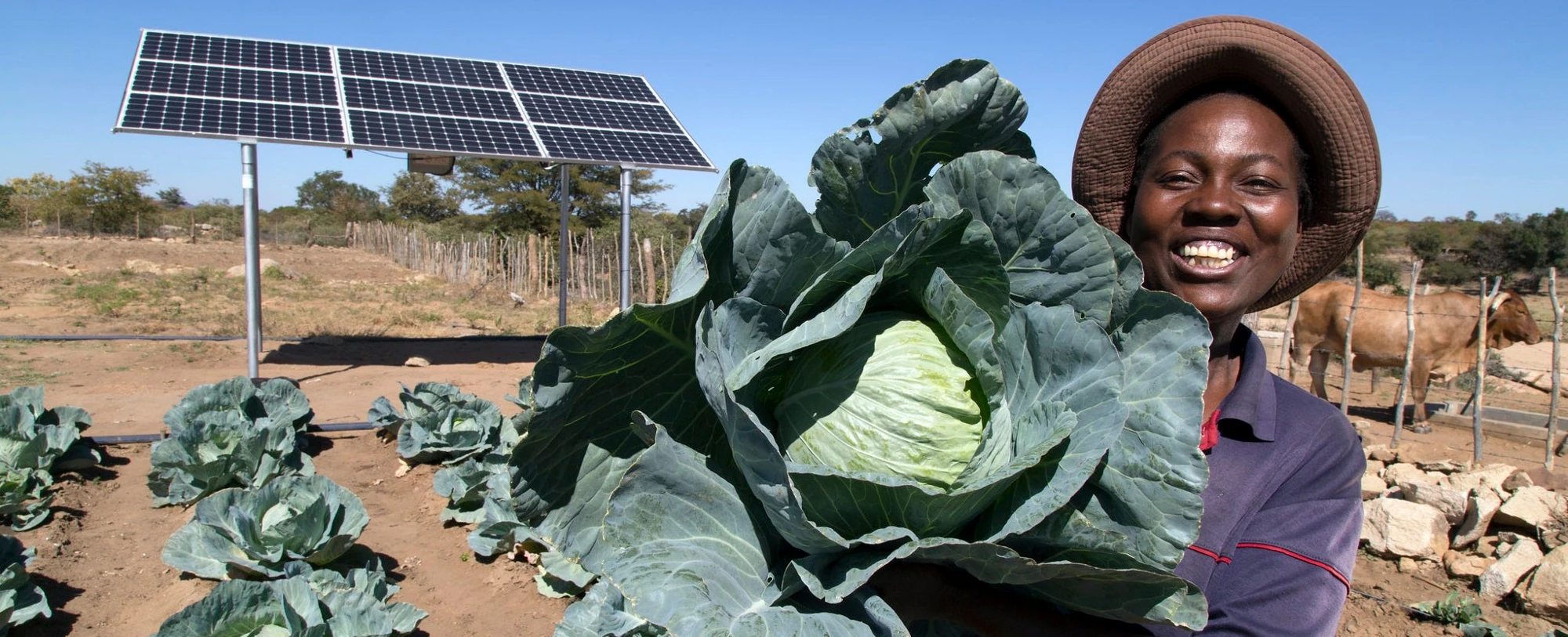 Solar powered irrigation in Zimbabwe. Photo by David Brazier
Solar powered irrigation in Zimbabwe. Photo by David Brazier
Irrigation is crucial for building food system resilience in a changing climate. This is especially the case in sub-Saharan Africa, which has a long record of devasting droughts. In Southern Africa alone, droughts cost the region USD 3.4 billion and affected well over 100 million people between 1980 and 2015.
In response to increasing climate variability, farmers have developed their own locally relevant and market-oriented irrigation solutions with little formal support. This farmer-led irrigation development (FLID) holds significant potential to boost resilience to external shocks, increase nutritional outcomes, and secure livelihoods.
But accelerating farmers’ action on irrigation is often hampered by a lack of financing and access to technology, markets, capacity, knowledge and good water governance. An enabling policy environment is also frequently missing.
An Africa-wide virtual forum was organized to exchange learnings among national governments, practitioners and the private sector. Presenting cases from across the continent, the forum introduced practical tools and contextually relevant approaches that offer opportunities for faster, more inclusive and sustainable FLID at scale.
As Gabriella Izzi, Senior Irrigation Specialist at the World Bank, put it, “We are past the phase of piloting FLID in Africa, and we should aim for massive scale-up in an inclusive and sustainable manner.”
Here are five key takeaways from the event.
FLID is gaining government attention
As countries face increasing pressure to meet development goals, governments are embracing the role they can play in removing the barriers to FLID. This has led to a shift in focus from large-scale, public infrastructure schemes to a facilitative approach towards irrigation whereby governments create an enabling environment in which farmer action and private enterprise can flourish.
In Ethiopia, for example, the government has introduced tax exemptions for smallholder irrigation technologies and is designing a national smallholder irrigation fund. Egypt, meanwhile, is rolling out digital innovations to enhance farmers’ knowledge of irrigation scheduling and water use to combat dwindling water resources and water scarcity.
Accelerating farmers’ action requires tailored solutions
An important part of creating an enabling environment is understanding what the barriers and opportunities are for different farmer groups. Several tools are facilitating this process, including the World Bank’s Farmer-led Irrigation Development Guide: A what, why and how-to for intervention design. As explained by Jonathan Denison, one of the authors, the guide provides a diagnostic framework that helps to define the potential for FLID as well as the main barriers to its expansion.
As these barriers can vary across scales and among different farmer groups, it is important to ensure the diagnostic analysis leverages farmers’ existing knowledge and experiences and identifies the most relevant irrigation solutions for each group. Interventions cannot be generic.
Affordable financing is limited but promising models exist
Limited access to affordable credit and other financing options was a recurring theme throughout the forum. At the same time, promising cases were presented from Uganda and Ghana that can provide useful lessons for other countries.
In Uganda, the government-run Micro-scale Irrigation Program subsidizes between 25% and 75% of the total cost of irrigation equipment for small farmers. Subsidy rates are based on factors such as farmers’ landholding and financial capacity. Solar-powered pumps are also subsidized at a higher rate than petrol-powered pumps to encourage the uptake of renewable technologies.
In Ghana, Pumptech, a private solar irrigation company, offers financing options tailored to its various customer segments. Each segment is slightly different in terms of the amount of water needed, land access, pump preferences and capacity to pay for the technology. For instance, farmers with limited resources, which often includes women, can buy a pump on a pay-as-you-own basis. This allows farmers to use the technology while making regular payments until the total cost of the pump is paid off. Payments may be weekly, monthly, quarterly or scheduled around harvest times when cash flow is highest, helping to reduce the payment default risk.
Strengthening irrigation supply chains and knowledge go hand in hand
Like access to financing, many forum participants identified access to irrigation technology and related services as a challenge.
In Rwanda, the Small-scale Irrigation Program is tackling this issue by subsidizing irrigation equipment sold by government-approved private providers. The program also aims to increase farmers’ capacity to effectively use and maintain the equipment by organizing visits to demonstration farms established with the providers. Together, these measures are helping to improve farmers’ knowledge of irrigation technologies while helping to develop effective irrigation supply and service chains.
Knowledge, water governance and coordination are key to reach scale
The interactive nature of the forum served as a platform to share learnings about FLID interventions across Africa. However, participants’ interest in continuing the conversation after the event also highlighted the need for more and better knowledge exchange in the years ahead. Existing initiatives like multi-stakeholder dialogues in Kenya, Mali, Ghana, and Ethiopia are successfully bringing together relevant actors to facilitate FLID nationally, but more is needed.
Achieving FLID at scale requires not only in-country coordination of various investment programs but also strengthening of water governance, innovative monitoring of water resource use, and ongoing knowledge exchange across regions as more FLID interventions are implemented.
The forum was co-organized by the African Union Commission (SAFGRAD), the Food and Agriculture Organization of the United Nations (FAO), the International Water Management Institute (IWMI), and the World Bank.



Join the Conversation